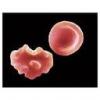Reputation Activity
-
 I think you do what is practical in your setting. There is no evidence one way or the other for prophylactic use of cold vs. room temp platelets in terms of actual bleeding prevention. Platelet count increments were the metric used, and we now know that platelet count is a relatively minor contributor to bleeding at counts much above 5-10,000/µl. So we're all operating based upon "expert" (often wrong) opinion, not actual data. In general, at platelet counts above 10,000/µl there is virtually no evidence of benefit for platelet transfusion and plenty of evidence of harm (particularly if not ABO identical). So the best clinical decision is often to postpone or eschew transfusion in my view. The long standing view that transfusion is almost always better than no transfusion is tragically wrong.
I think you do what is practical in your setting. There is no evidence one way or the other for prophylactic use of cold vs. room temp platelets in terms of actual bleeding prevention. Platelet count increments were the metric used, and we now know that platelet count is a relatively minor contributor to bleeding at counts much above 5-10,000/µl. So we're all operating based upon "expert" (often wrong) opinion, not actual data. In general, at platelet counts above 10,000/µl there is virtually no evidence of benefit for platelet transfusion and plenty of evidence of harm (particularly if not ABO identical). So the best clinical decision is often to postpone or eschew transfusion in my view. The long standing view that transfusion is almost always better than no transfusion is tragically wrong.
-
 You may not "mean to offend" but that does not make it any less offensive. If you have nothing helpful to contribute it's best not to.
You may not "mean to offend" but that does not make it any less offensive. If you have nothing helpful to contribute it's best not to.
I have worked in level 2 trauma centers with 24 / 7 coverage in the blood bank. I have also worked in a rural clinic in a Wyoming county the size of most states east of the Mississippi and there was not hospital in the county. The closest hospital was 2 hours by ground and if we needed a trauma center it was at least 3 hours to get a helicopter or airplane in and out. You do the best you can with what you have. The people of the county realized that one of the prices they had to pay for living in one of the most beautiful areas in the world was limited access to health care. They understood, accepted it and were actually grateful for the level we could provide! They neither wanted nor needed .......... I best stop now.
-
 Jbowker got a reaction from SbbPerson in BloodBankTalk: CJDI just answered this question.
Jbowker got a reaction from SbbPerson in BloodBankTalk: CJDI just answered this question.
My Score PASS
-
 Jbowker got a reaction from Malcolm Needs in BloodBankTalk: Bombay phenotypeI just answered this question.
Jbowker got a reaction from Malcolm Needs in BloodBankTalk: Bombay phenotypeI just answered this question.
My Score PASS
-
 Jbowker got a reaction from Malcolm Needs in BloodBankTalk: Dombrock Blood Group SystemI just answered this question.
Jbowker got a reaction from Malcolm Needs in BloodBankTalk: Dombrock Blood Group SystemI just answered this question.
My Score PASS
-
 Jbowker got a reaction from Malcolm Needs in BloodBankTalk: Diego Blood Group SystemI just answered this question.
Jbowker got a reaction from Malcolm Needs in BloodBankTalk: Diego Blood Group SystemI just answered this question.
My Score PASS
-
 Jbowker got a reaction from Malcolm Needs in BloodBankTalk: Correct Blood Bank NomenclatureI just answered this question.
Jbowker got a reaction from Malcolm Needs in BloodBankTalk: Correct Blood Bank NomenclatureI just answered this question.
My Score PASS
-
 Jbowker got a reaction from Malcolm Needs in BloodBankTalk: Correct Blood Bank NomenclatureI just answered this question.
Jbowker got a reaction from Malcolm Needs in BloodBankTalk: Correct Blood Bank NomenclatureI just answered this question.
My Score PASS
-
 Jbowker reacted to Malcolm Needs in CAP ALL COMMON CHECKLIST COM.04250So, this PROVES that CAP do not know the A from their elbow.
Jbowker reacted to Malcolm Needs in CAP ALL COMMON CHECKLIST COM.04250So, this PROVES that CAP do not know the A from their elbow.
ALL Blood Transfusion Reference Laboratory Staff, not to mention MOST Blood Transfusion Hospital Laboratory Staff KNOW that not all antibodies can, by any means, be detected by ALL serological techniques (saline, albumin, enzyme, LISS, IAT, inhibition tests, recombinant blood group proteins, etc), let alone by ALL technologies (glass, tube, plastic tube, liquid phase microtitre plates, solid phase microtitre plates, column technologies, etc), BUT THOSE WHO RUN CAP KNOW BETTER THAN EVERYONE.
They should be thoroughly ashamed of themselves, and go back to kindergarten.
-
 Jbowker reacted to Bb_in_the_rain in Mock-up casesFor those of who works in transfusion service laboratory and would like to learn more reference cases, I can post some mock-up cases here. If you would like me to do it, please hit the "heart" button on this post. If enough folks want to practice case studies on reference lab cases, I can post mock-up cases here weekly or so..
Jbowker reacted to Bb_in_the_rain in Mock-up casesFor those of who works in transfusion service laboratory and would like to learn more reference cases, I can post some mock-up cases here. If you would like me to do it, please hit the "heart" button on this post. If enough folks want to practice case studies on reference lab cases, I can post mock-up cases here weekly or so..
-
 Mine states the units are incompatible and gives the reason for the incompatibility.
Mine states the units are incompatible and gives the reason for the incompatibility.
-
 We had a melanoma patient on Nivolumab = Opdivo who apparently has hemolytic anemia but his IgG was only microscopically positive and his complement was negative. Hgb 5.5. Retic % slightly elevated, absolute retic normal, immature fraction retic very high. Bili and LDH normal. Hpt <14 and responded to steroids. They blamed this drug so I hunted up this article. This was new to me so I wanted to share it.
We had a melanoma patient on Nivolumab = Opdivo who apparently has hemolytic anemia but his IgG was only microscopically positive and his complement was negative. Hgb 5.5. Retic % slightly elevated, absolute retic normal, immature fraction retic very high. Bili and LDH normal. Hpt <14 and responded to steroids. They blamed this drug so I hunted up this article. This was new to me so I wanted to share it.
Clinical Trial Am J Hematol 2019 May;94(5):563-574. doi: 10.1002/ajh.25448. Epub 2019 Mar 13.
Clinical and laboratory features of autoimmune hemolytic anemia associated with immune checkpoint inhibitors
Rebecca Karp Leaf 1, Christopher Ferreri 2, Deepa Rangachari 3, James Mier 3, Wesley Witteles 4, George Ansstas 5, Theodora Anagnostou 6, Leyre Zubiri 1, Zofia Piotrowska 1, Thein H Oo 7, David Iberri 8, Mark Yarchoan 9, April K S Salama 10, Douglas B Johnson 11, Andrew D Leavitt 12, Osama E Rahma 13, Kerry L Reynolds 1, David E Leaf 14
PMID: 30790338 DOI: 10.1002/ajh.25448
Free article
Abstract
Immune checkpoint inhibitors (ICPis) are a novel class of immunotherapeutic agents that have revolutionized the treatment of cancer; however, these drugs can also cause a unique spectrum of autoimmune toxicity. Autoimmune hemolytic anemia (AIHA) is a rare, but often severe, complication of ICPis. We identified 14 patients from nine institutions across the United States who developed ICPi-AIHA. The median interval from ICPi initiation to development of AIHA was 55 days (interquartile range [IQR], 22-110 days). Results from the direct antiglobulin test (DAT) were available for 13 of 14 patients: 8 patients (62%) had a positive DAT and 5 (38%) had a negative DAT. The median pretreatment and nadir hemoglobin concentrations were 11.8 g/dL (IQR, 10.2-12.9 g/dL) and 6.3 g/dL (IQR, 6.1-8.0 g/dL), respectively. Four patients (29%) had a preexisting lymphoproliferative disorder, and two (14%) had a positive DAT prior to initiation of ICPi therapy. All patients were treated with glucocorticoids, with three requiring additional immunosuppressive therapy. Complete and partial recoveries of hemoglobin were achieved in 12 (86%) and 2 (14%) patients, respectively. Seven patients (50%) were re-challenged with ICPis, and one (14%) developed recurrent AIHA. Clinical and laboratory features of ICPi-AIHA were similar in DAT positive and negative patients. ICPi-AIHA shares many clinical features with primary AIHA; however, a unique aspect of ICPi-AIHA is a high incidence of DAT negativity. Glucocorticoids are an effective first-line treatment in the majority of patients with ICPi-AIHA, and most patients who are re-challenged with an ICPi do not appear to develop recurrence of AIHA.
-
 Jbowker reacted to Malcolm Needs in Ruling out Kell with Heterozygous cells?I am going to be REALLY unpopular here, but I'm going to say it anyway (because I am a pedant)!!!!!!!!!!!
Jbowker reacted to Malcolm Needs in Ruling out Kell with Heterozygous cells?I am going to be REALLY unpopular here, but I'm going to say it anyway (because I am a pedant)!!!!!!!!!!!
Antigens CANNOT be either heterozygous or homozygous; only genes can be heterozygous or homozygous.
An antigen can be described as either showing homozygous expression, or heterozygous expression.
That having been said, is a red cell sample that types as K+k- phenotypically, genotypically K/K or K/Ko, or even K/k, with a mutation within the Kell gene that prevents the k antigen being expressed and detected with all anti-k grouping reagents (just in case anyone doesn't believe me - we had one!).
That's got that off my chest.
Now then, there is NO doubt that there are some anti-K's around that only react with K+k- red cells (dosage), but they are fairly rare, however, how many people use antibody screening red cells that are K+k-? I doubt if there are any. Therefore, we are all ruling out anti-K using red cells with apparent K antigen heterozygous expression on every single sample that (apparently) has no atypical alloantibodies present. Am I wrong about this?
It follows, therefore, that, over the years, there MUST have been occasions when a patient with a very weak anti-K (one that is only detected using red cells that are apparently showing homozygous expression) and who has been transfused with K+ blood (do the maths). As far as I know, there are no papers within the literature that report a case of either a delayed or an acute transfusion reaction as a result of this. Yes, this may cause the anti-K to become stronger (and, hence, be detectable using an apparent heterozygous red cell sample showing K+k+ expression), but then, if this happens, you give K- blood.
So, my considered answer is that you can exclude using K+k+ red cells.
I shall now go and lie down!!!!!!!!!!!!!
-
 Jbowker got a reaction from tbostock in AABB AnaheimI'll be there! Haven't been since 2007...looking forward to it!
Jbowker got a reaction from tbostock in AABB AnaheimI'll be there! Haven't been since 2007...looking forward to it!
-
 Jbowker got a reaction from Linda0623 in AABB AnaheimI'll be there! Haven't been since 2007...looking forward to it!
Jbowker got a reaction from Linda0623 in AABB AnaheimI'll be there! Haven't been since 2007...looking forward to it!
-
 Jbowker got a reaction from Malcolm Needs in AABB AnaheimI'll be there! Haven't been since 2007...looking forward to it!
Jbowker got a reaction from Malcolm Needs in AABB AnaheimI'll be there! Haven't been since 2007...looking forward to it!



